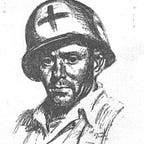Utilizing the CTC’s as an Interim Solution to Improving Medical Service Corps PME
Written by Captain Brad Smith
Do we have the best Professional Military Education (PME) system in place to educate and prepare Medical Service Corps (MSC) Lieutenants [1] to serve as Battalion Medical Operations Officers (MEDO)? The short answer is that we do not. Three weeks of MSC specific training at the end of Army Medical Department (AMEDD) Basic Officer Leadership Course (BOLC) is not enough to prepare our MSC Lieutenants for life as a member of a Brigade Combat Team.
We do not take into account the environment in which many Battalion MEDOs find themselves. MSC Lieutenants routinely find themselves assigned to a Battalion as a Primary Staff Officer as their first duty assignment. This places these Lieutenants into the position of being expected to know the ins and outs of Health Service Support (HSS) planning without the benefit of having an experienced MSC Officer to provide mentorship and guidance. Their Infantry, Armor and Artillery peers have the benefit of working for a Company Commander who is able to provide branch specific guidance and mentorship. Unfortunately, Brigade Support Medical Company (BSMC) Commanders and Brigade MEDOs often times do not adequately fill this void.
The long term solution should be to create a robust MSC specific BOLC that is separate from the other AMEDD Areas of Concentration (AOC).
How do we fix this problem? The long term solution should be to create a robust MSC specific BOLC that is separate from the other AMEDD Areas of Concentration (AOC). The course should mirror Maneuver BOLC common core in many ways. MSC Lieutenants need to learn tactics and the operations process at the platoon level as a foundation prior to moving onto HSS planning. The most important benefit will be the respect and confidence gained from completing a BOLC that is as difficult as their maneuver peers.
Battalion medical platoon operations and the Military Decision Making Process (MDMP) as a Battalion MEDO need to be the focus of the MSC specific track. The curriculum must provide in depth understanding of every aspect of Health Service Support within a Brigade Combat Team (BCT), starting with the Combat Lifesaver and moving up the echelons of care. Requiring Lieutenants to understand the Health Service Support system at this level of fidelity will set them up for success as they transition to become Battalion MEDOs. The Soldiers assigned to BCTs will reap the benefits if we take the time to produce better educated MSC Officers. These Soldiers are, arguably, our most important customers.
The Soldiers assigned to BCTs will reap the benefits if we take the time to produce better educated MSC Officers.
How do we bridge this gap in the interim? In the short term we can use the Combat Training Centers (CTC) [2] to bridge this knowledge gap. Lieutenants heading to a BCT can be sent TDY to shadow permanent party Observer-Controller/Trainer (OC/T) or to serve as guest OC/Ts. These Lieutenants will see first-hand how a medical platoon supports their maneuver battalion. They will experience struggles that are common across the Army with the benefit of not being in the hot seat. The end product will be a Lieutenant who better understands their role as a Battalion MEDO and is better prepared to support their Battalion from day one.
The bottom line is that we are not fielding Officers that are fully prepared to serve as Battalion MEDOs. This hurts the Medical Service Corps credibility and influence among Maneuver Officers. We need to improve the quality of Officer that we are sending out to the force. We should focus on our newly minted Lieutenants due to their proximity and interaction with Company and Battalion level Leaders within the BCT.
Captain Louis (Brad) Smith serves as the Commander of C/307th BSB, 1 BCT, 82nd ABN Division. He previously served as the Light Task Force Medical OC/T and the Brigade Medical OC/T at the National Training Center. The views expressed in this article are the author’s alone and do not reflect the official position of the Medical Service Corps, the Department of Defense, or the US Government.
